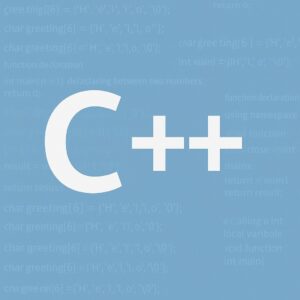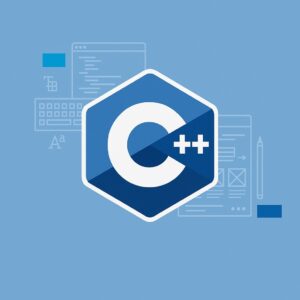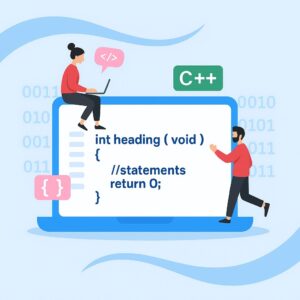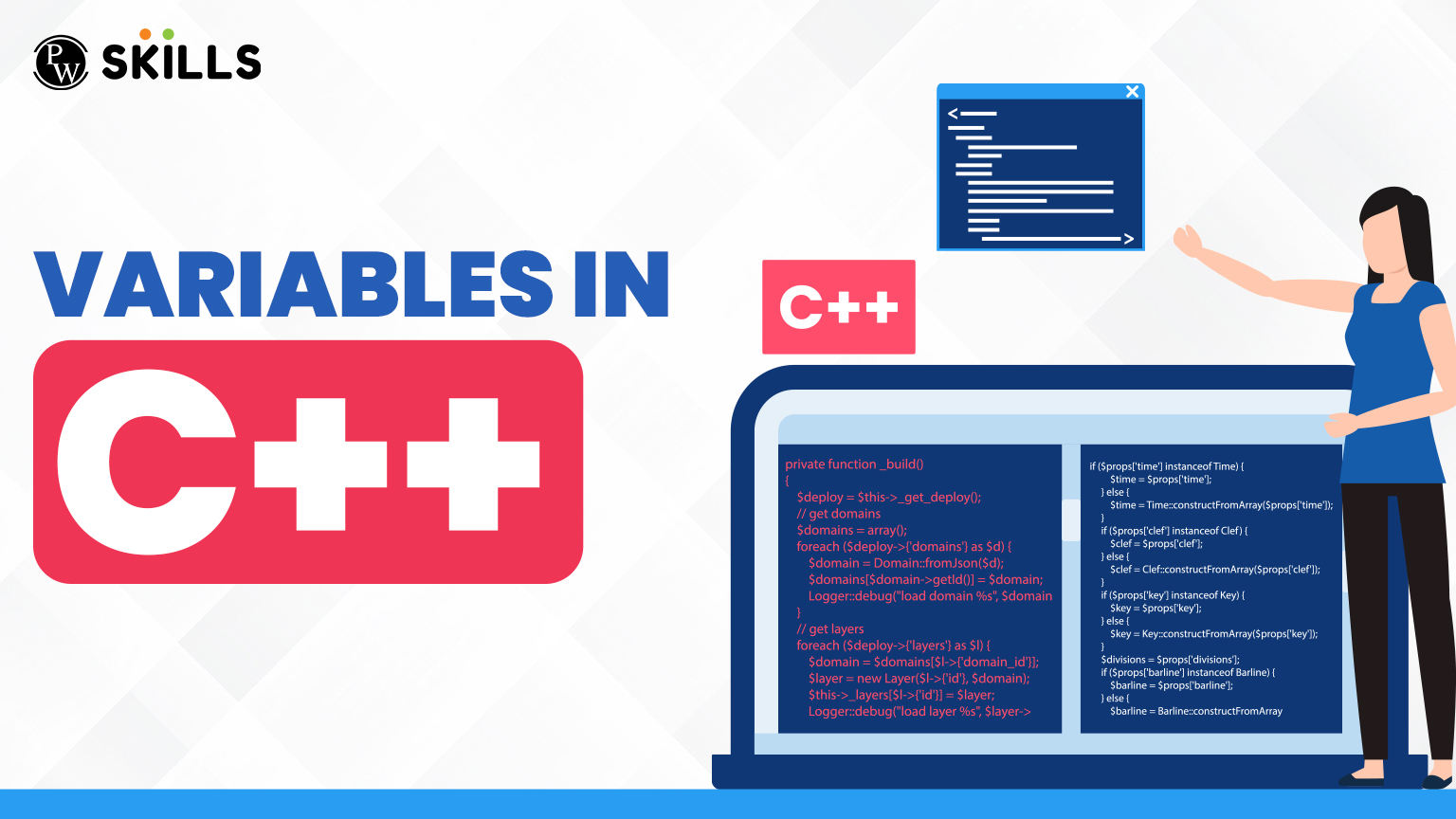Getting to Know Variables in C++ is among your earliest considerations when you start studying this great programming language. As either a beginner in school or an experienced pro reviewing your programming course, variables are something you will always come back to. In this article, we will discuss what variables are and how to declare and initialize them; rules to remember; and types of variables in C++. There is also a breakdown on reference variables, a crucial concept when dealing with sophisticated applications.
What are Variables in C++?
Let’s keep it straightforward before we go on: What are variables in C++? A variable in C++ is a named memory location to store a value. It is a container to keep information your program is able to access and change when it needs to. Values are numbers or letters or something else fancy. There is a name for each variable (called an identifier), a data type, and a value.
For instance:
int age = 25;
Here, age is an int variable and it is storing a value of 25. That’s it!

How to Declare and Initialize Variables in C++
To access a variable, you must first declare it. Declaration is informing the compiler of the variable’s name and type. You may also initialize a variable (set it to a value) when you declare it.
Declaration only:
float salary;
Declaration + Initialization:
float salary = 55000.75
You can also initialize several variables of the same type in a single line:
int x = 5, y = 10, z = 15;
Data type specifies what type of data a variable can hold
Some of them are:
int – integers
float – decimal numbers
char – characters
bool – true or false
double – bigger decimal numbers
These examples will provide you with a sense of how variables in C++ behave in real programs.
Naming Rules for C++ Variables
There are a few basic naming rules for variables in C++. If you adhere to them, your code will execute without errors and will be readable:
- Start with an underscore or letter (_). Don’t use numbers as your first character.
- No spaces or special characters like @, #, or -.
- Case-sensitive: Age and Age are different variables.
- Do not use C++ keywords such as int, return, or class.
- Give meaningful names like totalMarks for tm.
They are applicable to all of C++’s variables and are crucial for producing clean, bug-free code.
Types of Variables in C++
Now that you understand what variables are, let’s explore the different types based on their scope, usage, and storage:
Local Variables
Declared within a function or block and is available to be used only therein.
void show() {
int localVar = 10;
Global Variables
Declared outside any function and accessible from any part of the code.
int globalVar = 50;
Static Variables
Keep their values when the function is done running.
void count() {
static int num = 0;
num++;
}
Constant Variables
Values which are never changing when defined.
const float PI = 3.14;
They assist in making your code better organized and provide better control of memory and performance. Irrespective of how much you are building, employing the correct Variables in C++ is of great significance.

Reference Variable in C++
Another term you will come across is the reference variable in C++. A reference is also another name for an existing variable. Instead of copying data, it allows two names to refer to the same place of memory.
Here’s a simple example:
int original = 100;
int &ref = original; // ref is a reference to original
ref = 200;
// Now, original is also 200
Reference variables are often used for:
- Arguments to functions (avoiding copying of massive data)
- Returning multiple values from functions
- Memory optimization
- Understanding how a reference variable in C++ works can help you write more efficient and cleaner code.
Common Errors with Variables in C++
There are some common pitfalls that many beginners (and some professionals too) fall for when using Variables in C++. Take a look at these:
- Using a variable without declaring it
- Forgetting to initialize a variable before using it
- Re-declaration of a variable in the same scope
- Naming variables too similarly (like val1, val2, val3)
- Assuming float and double are the same
Learning from these mistakes helps you write more reliable programs.
Best Practices for Variable Use in C++
Whether writing small scripts or full applications, these are some habits to form:
- Make variable names descriptive and consistent
- Initialize variables when you define them
- Limit scopes to where the variable is needed
- Prefer constants for fixed values
- Utilize comments to clarify unusual variable usage or challenging logic
These are hints to keep your codebase well-maintained and simply debuggable. Variables in C++ are second nature with proper habits.

Real-World Examples Using Variables in C++
Let’s go through a mini practical example involving different types of Variables in C++:
#include <iostream>
using namespace std;
const float TAX_RATE = 0.18; // constant variable
float calculateNetSalary(float grossSalary) {
float tax = grossSalary * taxRate; // local variable
return grossSalary – tax;
int main() { float grossSalary = 50000;
float &salaryRef = grossSalary; // reference variable in C++
salaryRef += 5000; // raise salary
cout << “Net Salary: ” << calculateNetSalary(salaryRef);
return 0;
}
This is a brief code sample demonstrating how C++ Variables such as constants, local variables, and reference variables are combined to create a basic payroll calculator.
Resources to Learn Variables in C++
Variables in C++ are not really challenging to learn because you can learn them step by step with proper resources.
Books:
- “Programming: Principles and Practice Using C++” by Bjarne Stroustrup
- “Let Us C++” by Yashavant Kanetkar
Online Courses:
- PW Skills DSA C++ Course
- Coursera: C++ For C Programmers
- Udemy: Introduction to C++ Programming – For Beginners and Beyond
YouTube Channels:
- CodeWithHarry (Hindi)
- freeCodeCamp.org (English)
- MySirG (for newcomers
Practice Platforms:
- LeetCode
You are to form reasoning by doing smaller problems and incrementally building upon it in complexity.
Also Read:
- C++ Pointers Explained for Beginners – Types, Usage & Advantages (2025 Insights)
- Proxy Pattern | C++ Design Patterns
- History Of C++ | Timeline (+Infographic), List Of Versions, & More
- Hanging the Exception Handling in C++: An Effective Guide
Seeking a systematic and affordable medium to learn C++
Learn C++ the smart way with PW Skills. Their DSA C++ course blends concept clarity, problem-solving, and hands-on coding in a way that’s friendly for both beginners and working professionals. Join now and power up your programming journey with real-world skills.
Mastering of Variables in C++
Mastery of Variables in C++ is essential for producing efficient and well-optimized programs. Ranging from basic integer declarations to sophisticated reference management, variables are the foundation of all logic you ever create. The practice of Variables in C++ makes them second nature to you. So get your compiler going, code something small, and observe how variables act. That’s how you become a better programmer. Got any doubts? Drop your questions below. And if you found this useful, share it with your coding buddies.
FAQs
What are variables in C++?
A variable in C++ is a memory location with a name that stores a value used in your program.
How can I initialize several variables of similar data type in a single line?
You can code: int x = 5, y = 10, z = 15;
What is a reference variable in C++?
A reference variable in C++ is an alias of another variable and both of them will refer to the same memory location.


